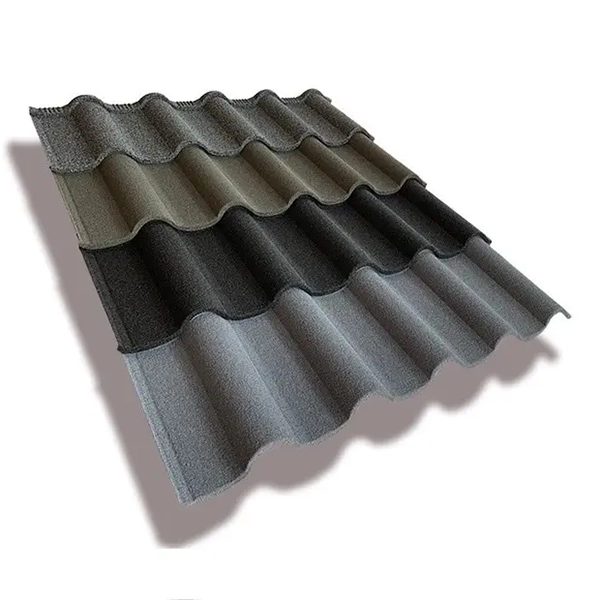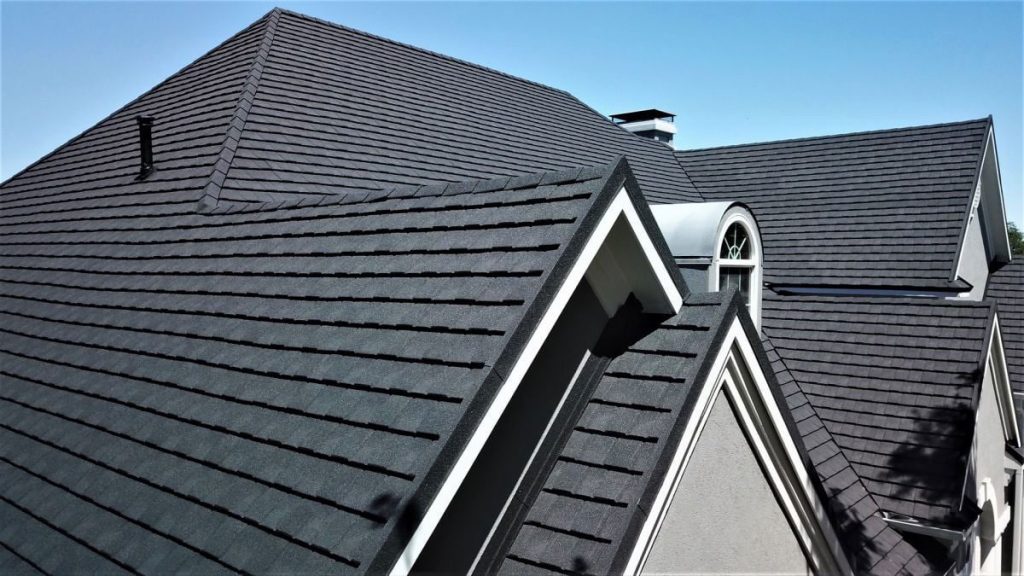You want a roof that stands up to time, looks professional, and keeps your costs in check. Stone Coated Steel Roofing tile gives you all three. This roofing option resists harsh weather and keeps its appearance for years. When you choose the right roof, you help protect your investment and boost your building’s value. Smart choices today lead to fewer problems tomorrow.
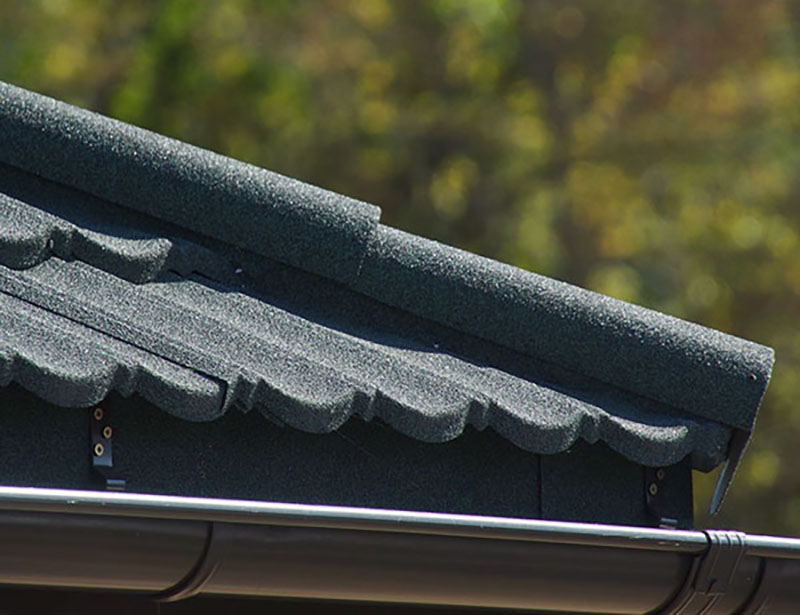
Key Takeaways
- Stone coated roofing tile offer durability, weather resistance, and a professional appearance for commercial buildings.
- These tiles are suitable for various property types, including offices, warehouses, and schools, enhancing both safety and aesthetics.
- Consider key factors like building size, weight capacity, and local climate when selecting a roofing system.
- Stone coated tiles have a long lifespan of 40 to 70 years, reducing the need for frequent repairs and replacements.
- Energy efficiency is a major benefit; these roofs can lower cooling costs by up to 25% through reflective properties.
- Minimal maintenance is required, as the stone coating resists dirt and algae, saving time and money on upkeep.
- While the upfront cost is higher, the long-term savings on energy bills and maintenance make stone coated roofing a cost-effective choice.
- Always consult a qualified contractor for installation to ensure proper techniques and adherence to local building codes.
Suitability
Property Types
You want your commercial building to stand out and last. Stone-Faced Steel Roofing works well for many property types. Offices often need a roof that looks professional and resists weather. Warehouses benefit from a lightweight roof that does not strain the structure. Retail spaces require a roof that attracts customers and keeps maintenance costs low. Industrial buildings need strong protection against harsh conditions. Schools and healthcare facilities also see advantages because these tiles offer safety and long-term value.
Tip: Stone coated roofing tiles fit both new construction and renovation projects. You can use them on buildings with steep or moderate roof slopes.
Key Factors
When you choose a roofing system, you must consider several important factors. Building size affects your decision. Large buildings need materials that install quickly and cover wide areas. Stone coated tiles measure between 1,300 mm and 1,400 mm in length and about 420 mm in width. These dimensions help you finish installation faster and reduce labor costs. Each tile covers about 0.45 to 0.5 square meters, so you get efficient coverage and a watertight seal.
Weight matters for your building’s structure. Each tile weighs only 2.5 kg to 3.0 kg. This light weight puts less stress on your roof frame compared to traditional materials. You do not need to reinforce most modern structures, which saves you money and time.
Intended use shapes your choice. If your building houses sensitive equipment or products, you want a roof that keeps out moisture and withstands impact. Stone-Faced Steel Roofing offers these benefits. You also want a roof that matches your brand image. These tiles come in many styles and colors, so you can pick one that fits your business.
You must think about local climate. Areas with heavy rain, snow, or wind need a roof that resists leaks and damage. Stone coated tiles perform well in these conditions. You also want to check local building codes before you start your project.
- Key factors to consider:
- Building size and roof slope
- Structural load capacity
- Intended use and occupancy
- Climate and weather patterns
- Local regulations and codes
Choosing the right roofing system helps you protect your investment and create a safe, attractive space for your business.
What Are Stone Coated Roofing Tiles
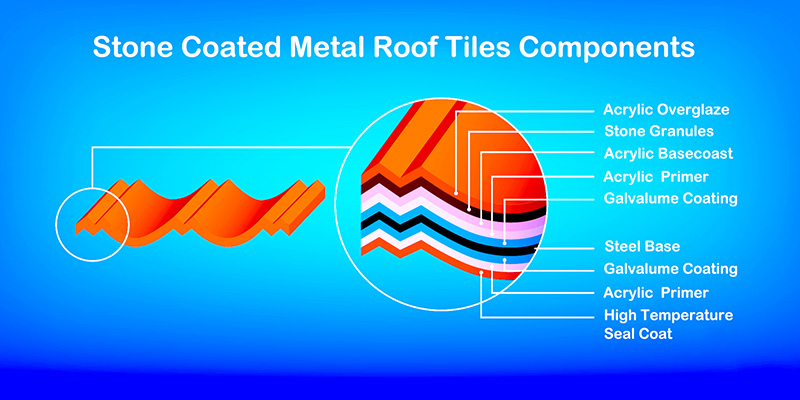
Composition
You want a roofing material that stands up to tough conditions and looks great. Stone coated roofing tiles use a layered design to achieve both goals. At the core, you find galvanized steel or an aluminum-zinc alloy. This metal base gives the tile strength and excellent resistance to rust. On top of the steel, manufacturers add an acrylic primer and base coats. These layers help the tile resist weather and keep moisture out.
The outer surface features natural stone granules set in an acrylic polymer. This stone layer gives the tile its color and texture. It also protects the steel from sunlight and impact. The result is a tile that can handle hurricane-level winds, hail, and even fire. You get a roof that lasts for decades and keeps your building safe.
| Component | Description |
|---|---|
| Core | Made from galvanized steel or aluminum-zinc alloy, providing strong corrosion resistance. |
| Outer Coating | Natural stone granules embedded in an acrylic polymer layer, enhancing durability and aesthetics. |
| Multi-layer protection | Includes acrylic primer and base coats for improved weather resistance. |
| Wind resistance | Withstands hurricane-level winds (up to 120-150 mph). |
| Hail resistance | Stone coating absorbs hail impacts, reducing damage risk. |
| Fire resistance | Non-combustible with a Class A fire rating. |
| Corrosion resistance | Protective zinc-aluminum base and stone coating offer superior rust resistance. |
Note: Stone-Faced Steel Roofing uses this advanced composition to deliver both beauty and performance for your commercial property.
Manufacturing (Witop Steel)
You want to trust the quality of your roofing tiles. Leading manufacturers like Witop Steel follow strict international and regional standards. These standards ensure each tile meets high marks for safety, durability, and performance. Witop Steel holds certifications such as ISO 9001, SGS, BV, and CE. These international marks show a commitment to quality. In different regions, Witop Steel meets local requirements like SNI in Indonesia, SABER in Saudi Arabia, and SONCAP in Nigeria. This wide range of certifications means you can rely on the product, no matter where your building stands.
| Certification Type | Certification Name/Region |
|---|---|
| International | ISO 9001, SGS, BV, CE |
| Domestic/Regional | SNI (Indonesia), SABER (Saudi Arabia) |
| Middle East | COC/COI (Iraq, Kuwait) |
| Africa | SONCAP (Nigeria), PVOC/COC (Morocco, Kenya, Tanzania, Uganda, Burundi, Ethiopia) |
Tip: Always check for these certifications when you select a supplier. They help guarantee the tiles will perform as promised.
Styles
You want your building to reflect your brand and attract attention. Stone coated roofing tiles come in several styles to match different architectural needs. The most popular options include tile, shake, and shingle profiles. Tile styles mimic the look of classic clay or concrete tiles. Shake profiles give you the appearance of hand-split wood shakes, which add a rustic touch. Shingle styles offer a clean, modern look that works well for offices and retail spaces.
Leading brands like DECRA set the standard for style and reliability. Their products offer a wide range of colors and finishes. You can choose a look that fits your business image and stands up to local weather. With so many choices, you can create a roof that is both functional and attractive.
Steel Stone Coated Roofing Tile Benefits
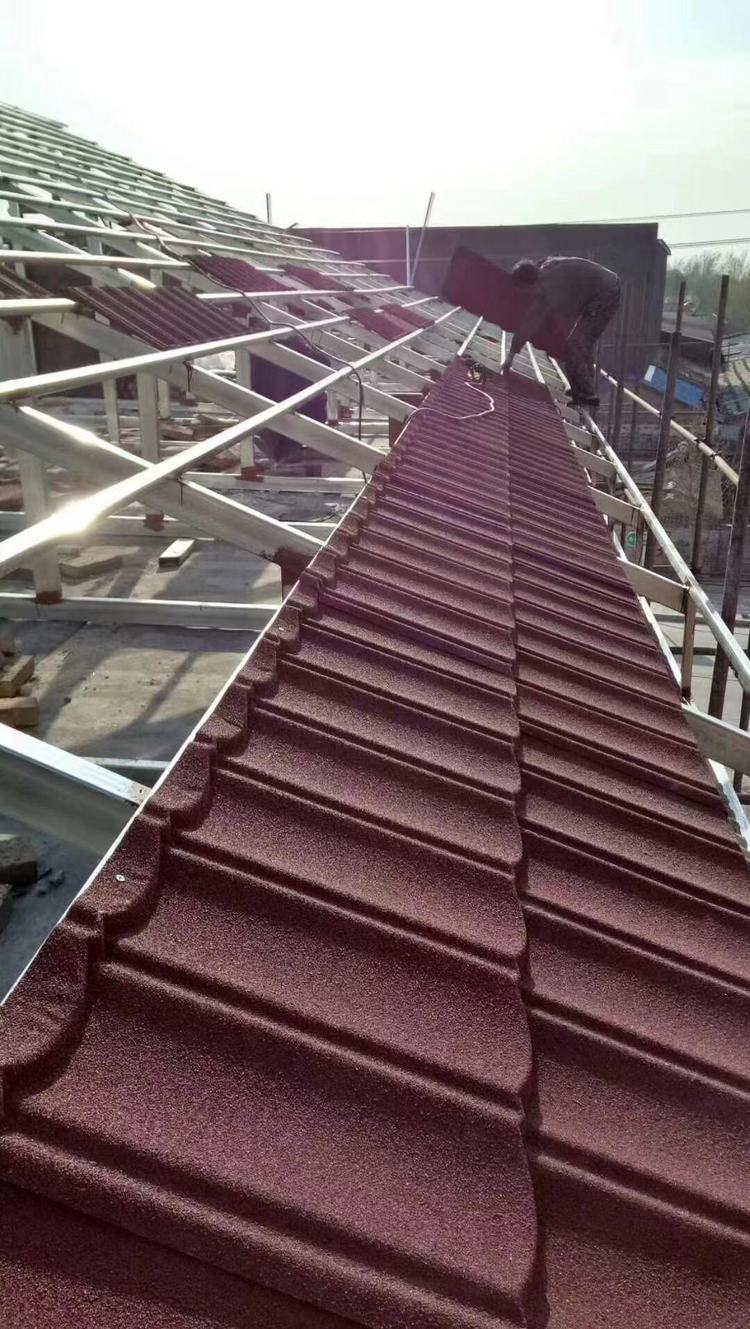
Durability
Weather Resistance
You want a roof that stands up to the toughest conditions. Stone-Faced Steel Roofing gives you strong protection against fire, hail, and wind. Here is how it compares to other roofing materials:
- Stone coated metal roofing has a Class A fire rating, which is the highest level of fire resistance.
- The steel core and stone coating make it non-combustible. This protects your building in wildfire-prone areas.
- Unlike wood shakes or asphalt shingles, it will not ignite or help spread fire.
- The steel substrate and stone coating provide excellent protection against hail and flying debris.
- These roofs are highly impact-resistant and perform well in severe weather.
- Metal roofing materials, including stone coated options, usually earn higher fire ratings than traditional materials.
You can trust Stone-Faced Steel Roofing to keep your property safe during storms and emergencies.
Lifespan
When you invest in a new roof, you want it to last. Stone-Faced Steel Roofing offers a much longer lifespan than most traditional options.
- The average lifespan of stone-coated steel roofing tiles ranges from 40 to 70 years.
- This is much longer than asphalt shingles, which usually last 15 to 20 years.
- Some products, like those from Westlake Royal Roofing Solutions, come with a 50-year warranty.
- You will need fewer repairs and replacements over time, which saves you money.
A longer-lasting roof means less worry and more value for your building.
Energy Efficiency
Insulation
Stone-Faced Steel Roofing helps you control your building’s temperature. The reflective coating on these tiles improves insulation. This means your roof reflects more sunlight and absorbs less heat. You get better energy efficiency compared to traditional materials like clay tiles. The reflective paint keeps your building cooler in the summer and helps lower your energy bills.
Cost Savings
You want to save money on energy costs. Stone-Faced Steel Roofing can help you do that.
- Stone coated metal roofing can reduce cooling costs by up to 25%.
- The reflective properties of modern metal roofing also help cut cooling costs by up to 25%.
Lower energy bills mean you can put more money back into your business.
Low Maintenance
Cleaning
You do not want to spend a lot of time or money on roof upkeep. Stone-Faced Steel Roofing needs very little maintenance. The stone coating resists dirt and algae, so you will not need to clean it often. If you do need to clean the roof, a simple rinse with water usually works. You avoid the hassle and cost of frequent repairs.
Warranty
You want peace of mind when you choose a roofing system. Leading brands like DECRA offer strong warranties for stone coated steel roofing tiles. Here is what you can expect:
| Feature | Details |
|---|---|
| Warranty Type | Lifetime Limited Warranty |
| Wind Resistance | Covers winds up to 120 miles per hour |
| Hail Resistance | Covers hailstones up to 2.5 inches in diameter |
| Registration Requirement | Not required for warranty coverage |
| Transferability | Transferable to a new owner within 20 years |
| Customer Support | Lifetime priority support for claims |
A strong warranty protects your investment and gives you confidence in your roofing choice.
Lightweight
Installation Speed
You want your roofing project to finish quickly and smoothly. Stone-Faced Steel Roofing helps you achieve this goal. The tiles weigh much less than traditional clay or concrete options. Each tile covers a large area, so you need fewer pieces to complete your roof. Contractors can move and position these tiles with ease. You see faster progress on installation days.
Many commercial buildings have tight schedules. You cannot afford long delays. Lightweight tiles reduce the time needed for lifting and securing each piece. Workers spend less effort on heavy lifting. You save on labor costs because the job requires fewer hours. Your business can open or resume operations sooner.
Tip: Ask your contractor about typical installation times for stone coated steel tiles. You may find that your project finishes days or even weeks ahead of schedule compared to other roofing systems.
Structural Impact
You want your building to stay strong and safe. Heavy roofing materials can put stress on your structure. Stone-Faced Steel Roofing solves this problem. The tiles weigh only a fraction of what concrete or clay tiles do. Your roof frame supports the load with ease.
Older buildings often need special attention. Heavy roofs may require extra reinforcement. Lightweight tiles usually avoid this issue. You can install them on most existing frames without costly upgrades. This saves you money and keeps your project simple.
Lightweight roofing also helps in areas with earthquakes or strong winds. Less weight means less risk of structural damage during extreme events. Your building stays secure and protected.
| Roofing Material | Average Weight (kg/m²) | Structural Impact |
|---|---|---|
| Stone-Faced Steel | 5-7 | Minimal, suits most frames |
| Clay Tile | 40-50 | May require reinforcement |
| Concrete Tile | 45-60 | Often needs upgrades |
| Asphalt Shingle | 10-15 | Moderate impact |
You make a smart choice when you select a lightweight roofing system. Your building benefits from easier installation and long-term safety.
Drawbacks
Noise
You may notice noise when rain or hail hits your roof. Stone coated roofing tiles absorb sound better than flat metal roofs. The texture and thickness of these tiles help dampen noise. You get less echo compared to standard metal roofing. Here is how stone coated tiles compare to other materials:
- Stone coated metal roofing absorbs noise from rain and hail more effectively than flat, uncoated metal roofs.
- Rain on asphalt shingles produces about 46 dBA, while metal roofs reach around 52 dBA over a complete roof assembly.
- The difference in noise levels between asphalt shingles and metal roofs is usually hard to detect. Sounds less than 8 decibels apart are not noticeable to most people.
- The stone coating improves sound insulation, making these tiles quieter than many other roofing options.
If your building sits near airports, highways, or railways, you want extra sound protection. Stone coated tiles offer sound insulation levels from 26 to 30 decibels. This helps reduce outside noise and creates a quieter indoor environment.
Tip: For even better noise control, you can add insulation under the roof. This solution works well for offices, schools, and healthcare facilities.
Cost
You need to plan for the upfront cost of stone coated roofing tiles. These tiles cost between $7 and $15 per square foot. Basic shake patterns start at about $7.50 per square foot. Premium tile styles average $8.25 per square foot. The price depends on the style, color, and brand you choose.
| Style | Average Cost (per sq. ft.) |
|---|---|
| Basic Shake Pattern | $7.50 |
| Premium Tile Style | $8.25 |
| Overall Range | $7 – $15 |
Stone coated roofing costs more than asphalt shingles or basic metal panels. You may hesitate because of the higher initial investment. Over time, you save money with fewer replacements, lower energy bills, and minimal maintenance. These savings add up and make stone coated roofing a cost-efficient choice for commercial buildings. You boost your property’s value and spend less on repairs.
Note: While the upfront cost is higher, the long-term financial benefits include fewer roof replacements, lower energy expenses, and minimal maintenance.
Installation
You want your roof installed correctly to avoid future problems. Stone coated roofing tiles require specialized skills. The installation process is more complex than laying standard shingles. Not every roofer has the experience needed for this job. You should hire a professional contractor who understands the unique requirements.
Common installation challenges include:
- The need for specialized skills and training.
- Improper installation can lead to leaks and a shorter roof lifespan.
- Poor fastening may cause panels to shift over time.
Qualified contractors follow several important steps:
- Structural assessment to verify your roof can support the tiles.
- Substrate preparation, including underlayment and ventilation.
- Panel installation according to manufacturer specifications for overlap and fastening.
- Flashing and trim to ensure watertight seals around roof penetrations.
- Quality inspection to confirm proper attachment and weather sealing.
Tip: Always check your contractor’s qualifications and experience with stone coated roofing tiles. Proper installation protects your investment and ensures your roof performs as expected.
Weight
You want a roofing material that does not overload your building. Stone coated steel tiles weigh much less than clay or concrete tiles. Each square meter of stone coated steel roofing weighs about 5 to 7 kilograms. In comparison, clay tiles can weigh up to 50 kilograms per square meter. This lighter weight makes stone coated tiles a smart choice for many commercial buildings.
However, you still need to think about your building’s structure. Older buildings may have weaker roof frames. Some structures were not designed for modern roofing materials. If your building is more than 30 years old, you should check the roof’s load-bearing capacity before installation.
Tip: Always ask a structural engineer to inspect your roof before you choose stone coated tiles. This step helps you avoid costly repairs or safety risks later.
Here is a quick comparison of roofing material weights:
| Roofing Material | Weight (kg/m²) | Suitability for Older Buildings |
|---|---|---|
| Stone Coated Steel | 5 – 7 | Usually suitable |
| Asphalt Shingles | 10 – 15 | Usually suitable |
| Clay Tiles | 40 – 50 | Often needs reinforcement |
| Concrete Tiles | 45 – 60 | Often needs reinforcement |
You may find that stone coated steel tiles work well for most modern buildings. For older properties, you might need to reinforce the roof frame. This extra step adds to your project cost and timeline.
If you plan to replace a heavy roof with stone coated steel, you can often reduce the load on your building. This change can improve safety and extend the life of your structure. On the other hand, if your current roof is very light, even the modest weight of stone coated tiles could require a closer look at your building’s support system.
- Key points to remember:
- Stone coated steel tiles are much lighter than traditional tiles.
- Most new buildings can support them without changes.
- Older buildings may need a structural check or reinforcement.
- Always consult a professional before installation.
Choosing the right roofing weight protects your investment and keeps your building safe for years to come.
Comparison
Metal Roofing
You may consider traditional metal roofing for your commercial building. Metal roofs use steel, aluminum, or copper panels. These panels resist fire and last longer than many other materials. Metal roofing stands up well to wind and rain. You get a roof that needs little maintenance. However, standard metal panels often look plain and industrial. They may not match the style you want for your property.
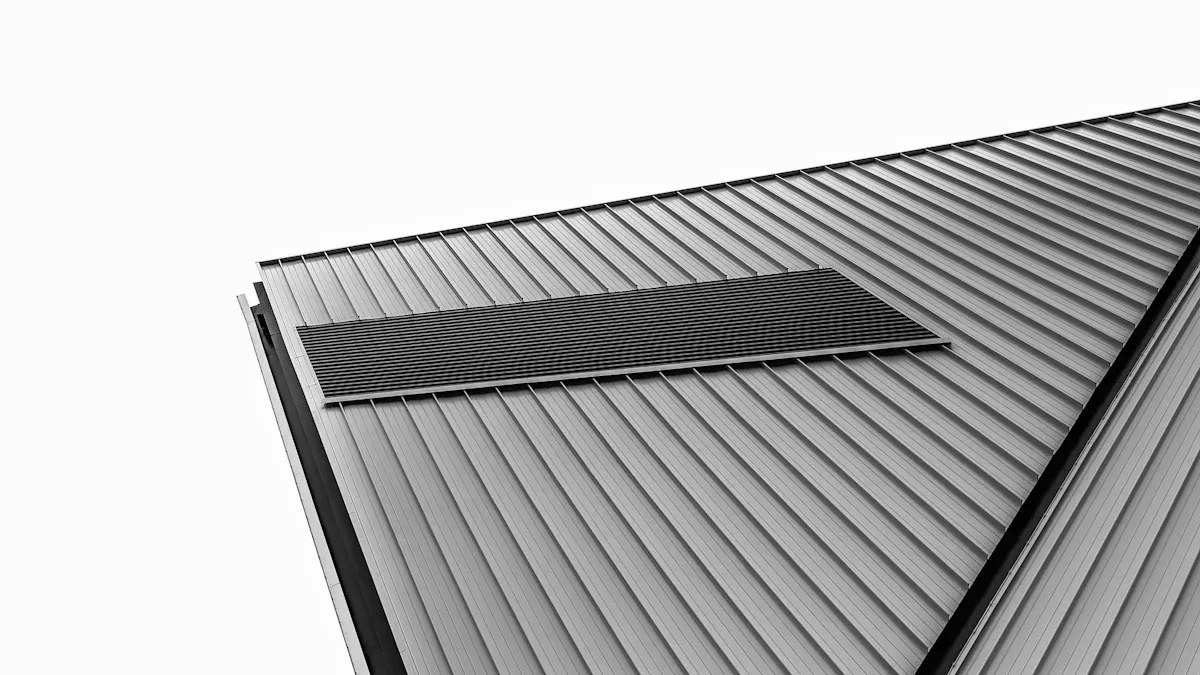
Stone-Faced Steel Roofing improves on basic metal roofing. The stone coating adds color and texture. You get the strength of steel with the appearance of tile, shake, or shingle. The stone layer also helps reduce noise from rain and hail. You enjoy a quieter workspace. Metal roofs can last 40 to 70 years, especially with a protective coating. You may pay more upfront, but you save money over time with fewer repairs.
Tip: If you want durability and a professional look, stone-coated options offer more design choices than plain metal panels.
Asphalt Shingles
Many commercial buildings use asphalt shingles. These shingles cost less than metal or stone-coated tiles. You can install them quickly. Asphalt shingles come in many colors, but they do not last as long as other roofing systems. You may need to replace them every 15 to 30 years. They can crack or lose granules in harsh weather.
Stone-Faced Steel Roofing lasts much longer than asphalt shingles. You get better protection against fire, wind, and hail. The stone coating keeps your roof looking new for decades. You also receive a strong warranty. Asphalt shingles rarely offer long-term coverage.
Here is a quick comparison:
| Roofing Type | Lifespan | Warranty |
|---|---|---|
| Asphalt Shingles | 12 to 20 years | N/A |
| Stone-Coated Shingles | 50 years | 50 years |
- Asphalt shingles usually last 15 to 30 years.
- Stone-coated metal shingles can last 40 to 70 years.
Note: If you want a roof that lasts and protects your investment, stone-coated tiles outperform asphalt shingles in every category.
Flat Roofing
Flat roofing systems use materials like built-up roofing (BUR), modified bitumen, or single-ply membranes. You often see these roofs on warehouses, retail stores, and office buildings. Flat roofs cost less to install. They make it easy to place HVAC units or solar panels. However, flat roofs need regular inspections. Water can pool on the surface and cause leaks.
Stone-Faced Steel Roofing works best on sloped roofs. You get better drainage and less risk of leaks. Flat roofs may not support the weight or design of stone-coated tiles. If your building has a flat roof, you may need to choose a different system. For sloped roofs, stone-coated tiles offer longer life and lower maintenance.
Tip: Always match your roofing system to your building’s design. Sloped roofs benefit most from stone-coated steel, while flat roofs need specialized materials.
Cost-Benefit
When you choose a roofing system for your commercial building, you want to know how your investment will pay off over time. Stone coated metal roofing tiles may cost more upfront than other options, but you gain significant advantages that save you money in the long run.
Let’s look at how stone coated metal compares to asphalt shingles over a 30-year period:
| Feature | Stone Coated Metal | Asphalt Shingles |
|---|---|---|
| Lifespan | 40-70 years | 15-25 years |
| Wind resistance | Up to 120 mph | 60-90 mph |
| Fire rating | Class A | Class A or C |
| Energy efficiency | High reflectivity | Poor to moderate |
| Maintenance | Minimal | Moderate to high |
You see that stone coated metal roofing lasts much longer than asphalt shingles. You avoid replacing your roof two or three times during the life of a stone coated system. This means you spend less on labor and materials over the years. You also reduce the hassle of frequent repairs and disruptions to your business.
Insurance companies often reward you for choosing stone coated metal roofing. The Class A fire rating and strong wind resistance lower your risk of damage. Many insurers offer premium discounts for buildings with these roofs. You save money every year on insurance costs.
Energy efficiency gives you another way to cut expenses. Stone coated metal tiles reflect sunlight and keep your building cooler. You can lower your cooling bills by up to 25%. Over decades, these savings add up and help your business stay profitable.
Maintenance costs stay low with stone coated metal roofing. You do not need to clean or repair the roof often. The stone coating protects against algae, dirt, and weather damage. You spend less time and money on upkeep compared to asphalt shingles, which need regular attention.
Tip: When you plan your budget, look beyond the initial price. Consider how much you will save on replacements, repairs, energy, and insurance. Stone coated metal roofing offers strong value for commercial properties.
If you want a roof that protects your investment and keeps costs predictable, stone coated metal tiles stand out. You get durability, safety, and savings that last for decades. Asphalt shingles may seem cheaper at first, but they often cost more over time due to frequent replacements and higher maintenance needs.
Choosing stone coated metal roofing helps you build a safer, more efficient, and more valuable property. You make a smart decision for your business’s future.
Considerations
Codes
You need to follow building codes and local regulations when you install stone coated roofing tiles on your commercial property. State and local governments set these rules to keep buildings safe and reliable. Most areas use model codes from groups like the International Code Council and the National Fire Protection Association. These codes often refer to standards from ASTM International. These standards help you make sure your roofing project meets all safety and quality requirements.
Before you start your roofing project, check with your local building department. Ask about permits, inspections, and any special rules for commercial roofs. Some areas have extra requirements for fire resistance, wind uplift, or energy efficiency. You may also need to follow rules about drainage or roof slope. If you ignore these codes, you could face fines or delays. You might even have to redo the work.
Tip: Always work with a contractor who understands local codes and has experience with commercial roofing. This step helps you avoid costly mistakes.
Climate
Your local climate plays a big role in choosing the right roofing system. Stone coated roofing tiles work well in many weather conditions. They resist heavy rain, snow, hail, and strong winds. If you live in an area with frequent storms, you want a roof that can handle impact and keep water out. In hot climates, you need a roof that reflects sunlight and keeps your building cool. Stone coated tiles offer good thermal performance and help lower your energy bills.
Cold climates bring other challenges. Snow and ice can build up on your roof. Stone coated tiles have a textured surface that helps snow slide off more easily. This feature reduces the risk of leaks or ice dams. If your area gets a lot of wind, look for tiles rated for high wind resistance. Always match your roofing choice to your local weather patterns.
Aesthetics
The look of your roof affects how people see your business. Stone coated roofing tiles give you many options for color and texture. You can choose a style that matches your brand and makes your building stand out. The roof is one of the first things people notice. A good-looking roof can boost your property’s curb appeal and market value.
Branding matters for commercial properties. You want your building to reflect your company’s image. Stone coated tiles help you create a unified design that fits with the rest of your building’s façade. You can pick colors and finishes that support your branding goals. This choice helps your property attract customers and tenants.
Selecting the right color and texture for your roof allows you to create a cohesive and visually appealing look. This decision can set your building apart from others in the area.
Stone coated roofing tiles give you the flexibility to design a roof that looks great and supports your business goals.
Budget
You want to make smart financial decisions for your commercial property. Stone coated roofing tiles require a higher upfront investment than many traditional roofing materials. You need to plan your budget carefully and look at both short-term and long-term costs.
Start by estimating the total cost of your roofing project. You should include material costs, labor, permits, and any structural upgrades. Stone coated tiles usually cost between $7 and $15 per square foot. The price depends on the style, color, and brand you choose. Labor costs vary by region and contractor experience. You may pay more for skilled installers, but you get better results and fewer problems later.
Tip: Ask for detailed quotes from several contractors. Compare what each quote includes. Some may cover removal of your old roof, disposal fees, or extra warranty options.
You need to think about your return on investment (ROI). Stone coated roofing tiles last much longer than asphalt shingles or basic metal panels. You may pay more now, but you save money over time. Fewer repairs, lower energy bills, and minimal maintenance add up. You also avoid the cost and hassle of replacing your roof every 15 to 20 years.
Here is a simple table to help you compare costs and savings:
| Roofing Type | Upfront Cost (per sq. ft.) | Lifespan (years) | Maintenance Cost | Energy Savings |
|---|---|---|---|---|
| Stone Coated Steel | $7 – $15 | 40 – 70 | Low | High |
| Asphalt Shingles | $3 – $6 | 15 – 25 | Moderate | Low |
| Basic Metal Panels | $5 – $10 | 30 – 50 | Low | Moderate |
You should also consider insurance savings. Many insurers offer lower premiums for buildings with stone coated steel roofs. The high fire rating and wind resistance reduce your risk. You may qualify for discounts that help offset your initial investment.
Budget planning helps you avoid surprises. Make a checklist of all possible expenses:
- Material costs
- Labor and installation
- Permits and inspections
- Old roof removal
- Structural upgrades (if needed)
- Warranty fees
- Insurance adjustments
You want to keep your project on track and within budget. Set aside a small contingency fund for unexpected costs. Roofing projects sometimes uncover hidden damage or structural issues.
Note: Investing in quality roofing pays off over time. You protect your property, save on repairs, and boost your building’s value.
You make a smart choice when you look beyond the initial price. Stone coated roofing tiles offer strong value for commercial buildings. You get durability, safety, and savings that last for decades.
Stone Coated Steel Roofing Decision Guide
Checklist
You want to make the right choice for your commercial roof. Use this checklist to guide your decision:
- Check your building’s roof slope and structure.
- Review local building codes and climate needs.
- Estimate your total project budget, including labor and materials.
- Ask about warranties and product certifications.
- Compare available styles and colors for your brand image.
- Assess your building’s age and structural load capacity.
- Request quotes from qualified contractors with experience in stone coated tiles.
- Plan for future maintenance and cleaning needs.
Tip: Print this checklist and use it during meetings with your roofing contractor. It helps you stay organized and focused.
When to Choose
Stone-Faced Steel Roofing works best in several situations. You should consider this option if you want a roof that lasts for decades and resists harsh weather. If your building sits in an area with strong winds, hail, or fire risk, this roofing system gives you peace of mind. You also benefit if you want to lower long-term maintenance and energy costs. Many property owners choose this roof for its attractive appearance and wide range of styles.
You may find this roofing system ideal for offices, retail stores, schools, and healthcare buildings. If your project involves a renovation, the lightweight tiles often fit existing structures without extra support. You also gain value if you want a roof that boosts your property’s curb appeal and market value.
Alternatives
Sometimes, another roofing system may suit your needs better. If your building has a flat roof, single-ply membranes or built-up roofing may work best. Asphalt shingles cost less upfront and install quickly, but they do not last as long. Basic metal panels offer durability but may lack the style you want. Clay or concrete tiles provide a classic look but add more weight and may need extra support.
| Roofing Type | Best For | Main Drawback |
|---|---|---|
| Single-Ply Membrane | Flat roofs, quick installation | Shorter lifespan |
| Asphalt Shingles | Low cost, fast projects | Frequent replacement |
| Metal Panels | Durability, fire resistance | Industrial appearance |
| Clay/Concrete Tiles | Classic style, long life | Heavy, costly support |
Note: Always match your roofing choice to your building’s design, climate, and long-term goals. Consult a roofing professional for tailored advice.
Stone coated roofing tiles give you durability, energy savings, and a professional look. You may face higher upfront costs and need skilled installers. Use this checklist to guide your choice:
- Review your building’s structure and local codes
- Compare styles and warranties
- Plan your budget
Speak with a roofing expert for advice tailored to your property. Request a quote or more information to start your project with confidence.
FAQ
How long do stone coated roofing tile last?
You can expect stone coated roofing tiles to last 40 to 70 years. Their steel core and stone coating protect against rust, fire, and impact. You get a roof that outlasts most traditional materials.
Are stone coated tile suitable for all roof slopes?
You can use stone coated tiles on most sloped roofs. They work best on moderate to steep slopes. Flat roofs do not provide enough drainage for these tiles.
Do stone coated tile require special maintenance?
You do not need much maintenance. You can rinse the roof with water to remove dirt. The stone coating resists algae and mold. You should inspect the roof yearly for damage.
Can you install stone coated tile over an old roof?
You can install stone coated tiles over some existing roofs if the structure supports the weight. Always ask a roofing professional to check your building before installation.
How do stone coated tile perform in extreme weather?
You get strong protection from wind, hail, and fire. These tiles resist winds up to 120 mph and hail up to 2.5 inches. The steel core and stone layer keep your building safe.
Are stone coated roofing tile energy efficient?
You save on energy bills with stone coated tiles. The reflective surface keeps your building cooler in summer. You can reduce cooling costs by up to 25%.
What styles and colors are available?
You can choose from tile, shake, and shingle profiles. Many brands offer a wide range of colors. You can match your building’s style and branding easily.
Do stone coated tile come with a warranty?
Most brands offer strong warranties. For example, DECRA provides a lifetime limited warranty. You get coverage for wind, hail, and manufacturing defects.

